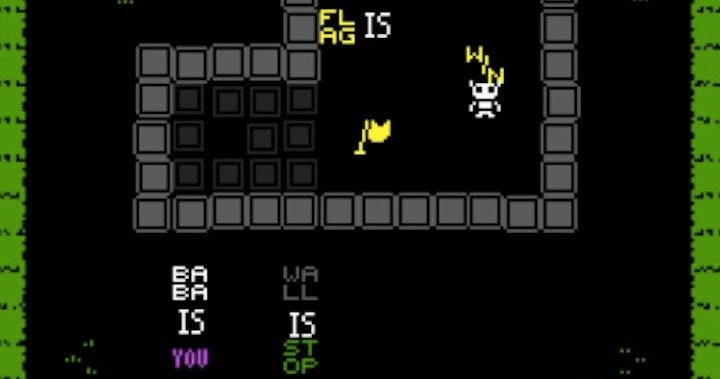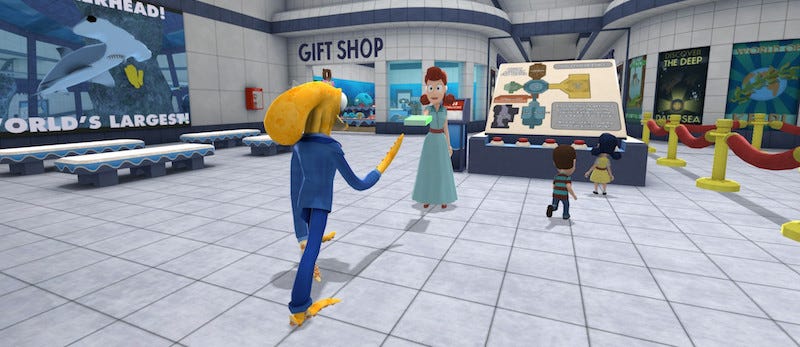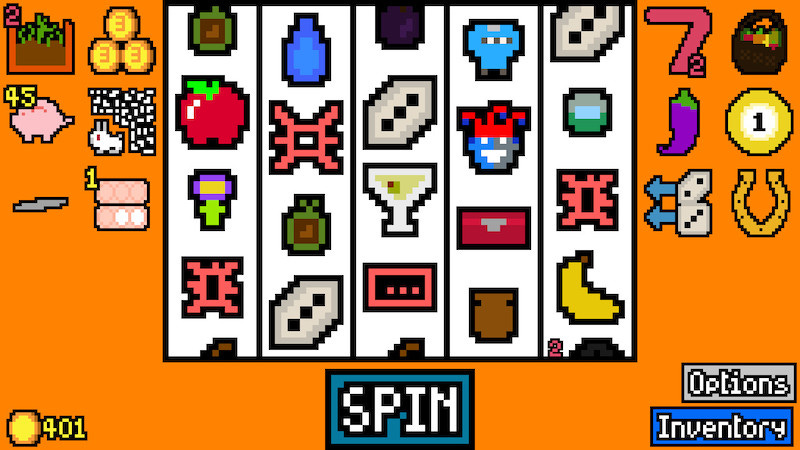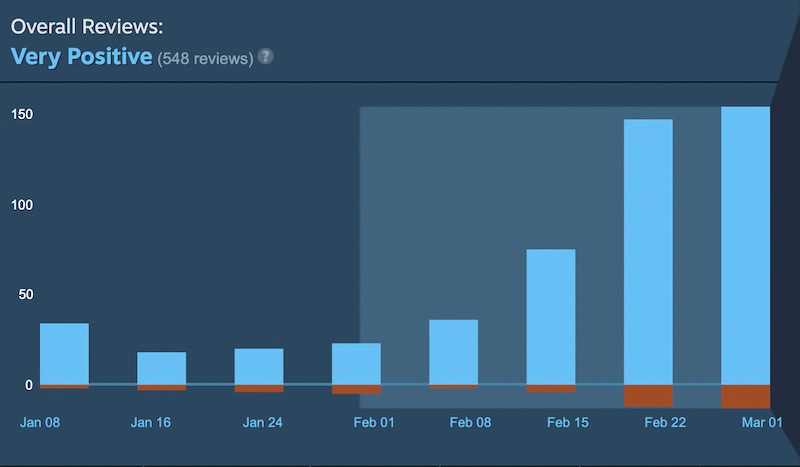How do you fund that game prototype?
Publikováno: 1.3.2021
The first step can be the hardest.
[The GameDiscoverCo game discovery newsletter is written by ‘how people find your game’ expert & GameDiscoverCo founder Simon Carless, and is a regular look at how people discover and buy video games in the 2020s.]
Welcome back to the GameDiscoverCo newsletter, as we enter a brand new month, and head rapidly towards the ides of March (watch your back!) Thanks for everyone who supported us with a paid subscription so far this year, too - your ranks are growing swiftly.
The video game industry continues to be in boom time. And I’m sure we’ll continue to do well, even as some of the worldwide COVID lockdowns ease. So let’s get to the latest game discovery and platform news:
Vertical slice/prototypes - how to get started?
Perhaps starting this section with a screenshot of the game jam version of Baba Is You is missing the point. (It’s a high-concept idea that took a relatively short amount of time and money to put together.)
But wanted to feature a notable prototype/vertical slice screenshot, since an excellent social media conversation expanded on a recent conversation on what game publishers could be doing better. And that is.. how on Earth do you get your prototype funded? Can’t do game discovery if you don’t have a game.
The Twitter conversation was started by Loveshark’s Rosa Carbó-Mascarel, who asked, simply: “How did you fund your first prototype BEFORE getting publisher funding or investment? Especially interested in hearing candid answers from studios led by white men. So many marginalised devs in my timeline and DMs rn who are baffled by how you do it.”
There’s no doubt that built-in privilege - whether gender/racial, financial, or other, plays a significant part in this. And the replies really illuminate how tricky it is to get your project going, and how many studios have been gradually bootstrapped.
Firstly, here’s some folks from multi-million $ grossing games weighing in on how they did it:
Adam Bromell (Astroneer) said, in part: “We each put $10k [in his case borrowed] in to the company. Then I worked on it during evenings and weekends as that's what I could afford. My partners worked on it full time by living off of money they saved from working in AAA… Once we had… demos we secured combined ~$500k in funding from a platform deal and investors, and used that to launch Early Access.”
Philip Tibitoski (Bugsnax/Octodad, pictured below) noted: “We worked full time day jobs from 2010 until Octodad made money in 2014. We also raised $24K from Kickstarter. But that largely covered travel costs to conventions over those years and a few software licensing fees, since that's not nearly enough to pay 8 people to work on a game.”
Chris Bourassa (Darkest Dungeon) said: “I had 24k saved from my 14 yr career in games. Had a mortgage, a small child, and did freelance 20-25 hrs a week to stretch my savings while working on my project for ~50hrs/week. My partner similarly bootstrapped. That got us to Kickstarter.”
And there’s plenty of other notable replies, speaking to the many improvised ways in which people made their prototype funding work:
Corey Warning (Floppy Knights) said: “Client work: before we started making our own original games, we were working as a sort of white label studio. We helped other teams launch their games, handled marketing, and built prototypes and boring apps for agencies and what not… We used the margins from some of the better paying gigs to put together prototypes and start pitching to publishers. It took us almost 5 years to be able to fully shed the client work stuff and focus on our own games.”
Sally Blake (Silent Games) noted: “I worked 3 days a week at No More Robots… Teeside University pay their students to be interns at studios so we got them… We did a bunch of contract/freelance work alongside… We won the UK Games Fund grant… We got the coronavirus relief fund from the UK government.”
Tomer Barkan (Dream Engines: Nomad Cities) said: “Before EA launch of Judgment: Apocalypse Survival Simulation I worked 3 days a week in a paid programming job, which was enough to pay basic wages/living costs for a 2-person team. But I had 7 years of professional programming experience (non-gamedev) before going indie. After our EA launch we could afford to go full-time.”
Wren Brier (Unpacking) commented: “Freelance work! I was freelancing as a games artist and UX/UI designer in the year before prototyping Unpacking and also during my first year working on it. Worked at a mobile games company for a few years before that.”
As for what can help with this: actual proto funding, of course! But with the glut in supply of games looking for publishing help, publisher-funded prototypes are vanishingly rare. Danny Day (Desktop Dungeons) notes he’s worked on a pub-funded proto in replies, in part because of his track record, but it stands out because it’s so rare.
Besides contract work, savings, and other jobs, government arts funding is often a great bootstrap. But that depends almost entirely on where you live in the world. So… it’s really tricky.
Danny also nails a lot of the hidden privilege of this whole conversation, one I think it’s good to think about as we conclude: “The privilege is always in the long-term stuff: being able to dedicate years to learning through failing, knowing that if shit doesn't work you can go eat at home; being present at tables where people are talking about "looking for someone to X"; having transport to events.
[To be honest] I think most local white dudes don't think of a prototype as something they "funded". They ”just made it” because they had time, space and hardware. Did their other job/parents covering tuition/lack of dependents to support/etc allow that? Yeah, but they can't see how it paid.”
The game discovery news round-up..
Finishing up this fine newsletter, let’s get to the link round-up. And ugh, after reading about and watching videos on the above game, I really want to play it. Better write about things instead, before I get distracted:
If you didn’t spot it, Steam Remote Play Together - which allows local co-op games to be played remotely via streaming: “can now be used to invite anyone to play games with you, even if they don't have a Steam account - all they'll need to do is install an app.” My impression is that this is used casually, but not (yet) super extensively, and online co-op is still a vital feature. But not sure! (Parsec is also used a lot by Steam players, btw.)
Xbox Game Pass is still a biz model Sony doesn’t want to emulate directly. But the company is continuing to up the quality of the PlayStation Plus free games. March’s picks include Final Fantasy VII Remake (just the PS4 version!) and Annapurna and Graceful Decay’s first-person puzzler Maquette (on PS5 only - ugh, this is getting confusing). The PlayStation Now streaming service is also adding games, though anemically compared to Game Pass.
Huh, looks like Valve has to hand over sales data to Apple as part of the ongoing Epic vs. Apple contretemps. Specifically, it’s “yearly sales and pricing data on 436 games that are available on both its PC game distribution platform, Steam, and the Epic Games Store.” (But the data is under a protective order, so won’t directly become public.) Still… a slightly weird situation, for sure.
New information on the Xbox Game Streaming app for Windows via The Verge - “Once released, the app will let Windows users stream games from their Xbox Series S / X consoles, and from xCloud.” Definitely interesting to see Xbox console to PC streaming. Bet that’ll be helpful for those who have underpowered PCs, since “you can remotely wake an Xbox console, sign in, and play games wherever you are.”
Microlinks: Check out an intriguing European game journalist survey from Bastion, surveying over 120 of ‘em on what’s hot; we’re already into the ‘best games of 2021 so far’ retrospectives, phew; the top new Steam releases of January 2021 (by revenue) include Early Access titles in 12 out of 20 cases, which is a little surprising.
Finally, you know the ‘your game launches kinda eh but suddenly takes off’ dream that you all have, after a disappointing debut? Well, short-play slot machine roguelike (?!) Luck Be A Landlord(pictured above) is living that dream right now, following an early January Steam Early Access launch. Check out its surprising reviews graph on Steam:
If we check YouTube, it looks like heavy video support from roguelite streaming don Northernlion (multiple videos) as well as DangerouslyFunny (two videos, over 500k views total) likely fueled the sales renaissance. So don’t give up hope. But you’ve got to have serious hidden design smarts and hook to get that comeback to happen.
[We’re GameDiscoverCo, a new agency based around one simple issue: how do players find, buy and enjoy your premium PC or console game? You can subscribe to GameDiscoverCo Plus to get access to exclusive newsletters, interactive daily rankings of every unreleased Steam game, and lots more besides.]



